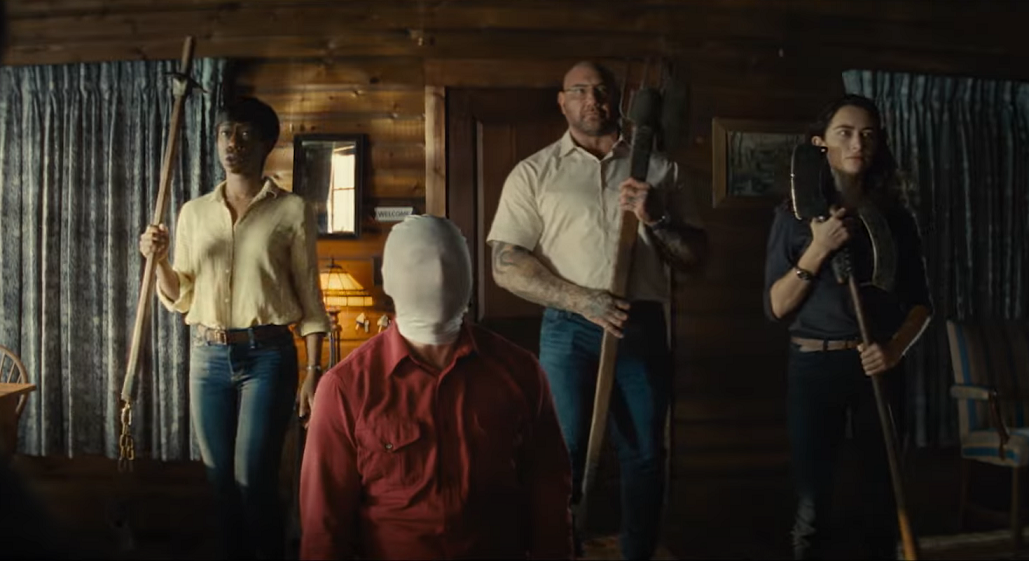Knock at the Cabin

“Always together.”
He did it again. Easily one of the most distressing things I’ve ever seen. Shyamalan is one of my favourite working directors, and I would’ve expected nothing less than something impeccably taut that extracts as much agony from all the potential implications of the impossibilities he posits. But even as someone who was moved to tears by the utilization of the image as a liberatory instrument at the end of Glass, I could not have anticipated how acutely, painfully incisive Knock at the Cabin is about the experience of queerness.
Much like Old, his concerns with the reproduction of the nuclear family across generations manifests itself here in the form of geometric expressionism, whereby the carefully constructed geography of the film’s world is gradually abstracted by duelling forces and ideologies. The difference here, of course, is that the bounds of the nuclear family are less a source of comfort that one recedes into in times of desperation because there’s no other way out than it is something that corrupts and acts as a festering wound, tearing itself open in front of Eric and Andrew until it inevitably infects either one of them. The parasitism of the ideal family, something that lingers over every frame of the film, is something that lends a degree of validation to the sickening but oddly comforting notion that to be targeted for the fact that they can never truly encapsulate this ideal is the key to explaining everything that unfolds in the film- which makes it all the more horrifying when it becomes apparent that something else, something purely beyond the pale, is at play. There’s not even room for anger by its end, because to muster rage at injustice is to deem someone a perpetrator, something that the film’s ending simply doesn’t allow the luxury for- like Kurosawa’s Pulse, all these reams of tangled emotion unspool into stretches of the barren and cloudy.
Witnessing the ways in which Shyamalan stages bodily transformation (albeit of a much different kind than the Eastrail 177 trilogy), I am reminded of Ballard- more specifically, I am reminded of the persistent undercurrent throughout his structural dystopias of High-Rise and Super-Cannes of the breaking of the body acting as an expression of the social conditions that his novels construct. Violence in Knock at the Cabin, despite its tendency to shy away from actually depicting the wounds that bind, is Ballardian in that it is an expressionistic, baroque vehicle for the reproduction of the social conditions that the film resides within. The physical trauma of a hate crime is repeated, only this time it is incurred upon his partner. In a state of spiritual exaltation, an acolyte enshrouds their face, rendering themselves anonymous in front of their god and feigning the act of suicide, before responsibility for their death is lifted from their hands into that of the executioner carrying the weapon that splits their skull into two. In The Origin of German Tragic Drama, Walter Benjamin asserts that only as corpses can the characters of his Trauerspiel enter the homeland of allegory. It is therefore only through death that the body/bodies of Knock at the Cabin become meaningful- Shyamalan is no stranger to allegorical contortion of the body (one need only witness the scene in Old where a woman with a calcium deficiency becomes a mangled mass of bones in a cave lit by torchlight), but here there is very little room for such allegorical representation. What is happening to the film’s characters is not metaphorical, it is not allegorical and it is not a dream- contained and defined by the specificity of its orchestrators it may be, but it is less an exceptional situation than it is just another one of the countless instances where queer people are forced to choose between saving their lives and allowing themselves to open themselves to the possibility of love. The choice was made long before it was presented to them.
Walking away in the same state of wordless shock that Shyamalan’s last couple films have left me in, I was reminded of the work of McCarthy- more specifically, I was reminded of his screenplay for The Counselor, a film which, like Knock at the Cabin, wrestles with coming to terms with something that once seemed an impossibility. A very particular sort of ontological numbness is what stays with me as I write this, a resignation to the notions of nihilism that McCarthy and, in this particular case, Shyamalan espouse: that it’s no one’s fault, but that someone always has to suffer the consequences of someone else’s guilt. It feels only befitting to end with a refrain that echoes in the third act of McCarthy's screenplay:
“You said I was that man - at that crossing”
“Yes. At the understanding that life is not going to take you back. You are the world you have created. And when you cease to exist, this world that you have created will also cease to exist. But for those with the understanding that they're living the last days of the world, death acquires a different meaning. The extinction of all reality is a concept no resignation can encompass. And then, all the grand designs and all the grand plans will be finally exposed and revealed for what they are. And now, Counselor, I have to go, because I have to make other calls.”
